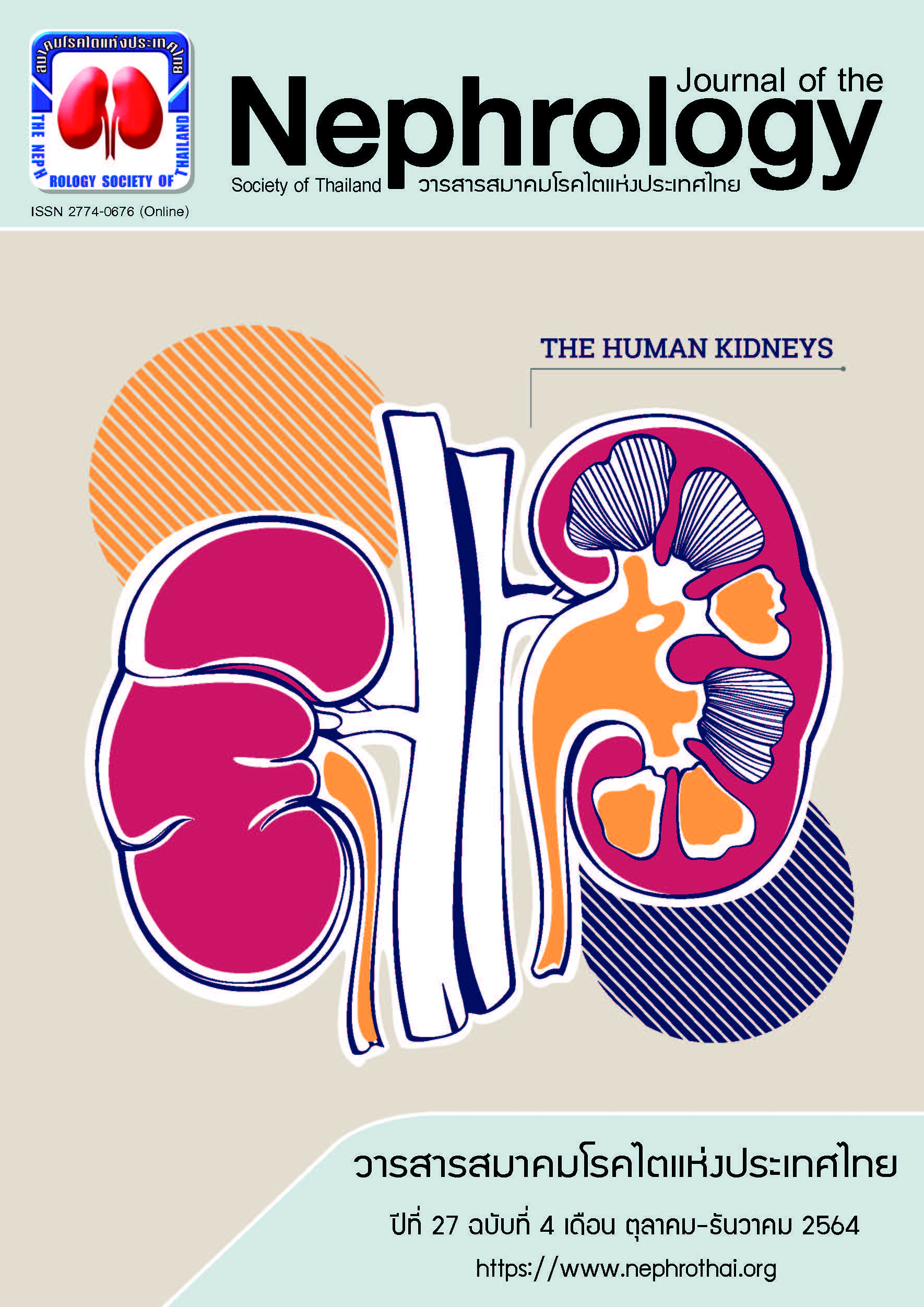Depression in chronic kidney disease
Main Article Content
Abstract
Depression is highly prevalent in chronic kidney disease (CKD), including those with end stage renal disease (ESRD) on dialysis. Depression is associated with poor quality of life and increased mortality. Self-reported questionnaires have been used to screen depression, and patients who screen positive for depression should be referred to a qualified professional to confirm the diagnosis with a clinical interview. Risk factors associated with depression in CKD are diverse. Potential explanations for the high burden of depression observed among patient with CKD can be divided in those related to primary depression and to secondary depression from clinical illness. Limited evidence exists for a general recommendation to routinely use antidepressive agents, including types and dosages in CKD populations. Many gaps remain in current knowledge of depression in CKD. Further investigation on the mechanisms, prevention and treatment of depression in these populations are required.
Article Details

This work is licensed under a Creative Commons Attribution-NonCommercial-NoDerivatives 4.0 International License.
This article is published under CC BY-NC-ND 4.0 license, which allows for non-commercial reuse of the published paper as long as the published paper is fully attributed. Anyone can share (copy and redistribute) the material in any medium or format without having to ask permission from the author or the Nephrology Society of Thailand.
References
Cukor D, Fruchter Y, Ver Halen N, Naidoo S, Patel A, Saggi SJ. A preliminary investigation of depression and kidney functioning in patients with chronic kidney disease. Nephron Clin Pract. 2012;122(3–4):139-45.
Lee Y-J, Kim MS, Cho S, Kim SR. Association of depression and anxiety with reduced quality of life in patients with predialysis chronic kidney disease. Int J Clin Pract. 2013; 67(4):363-8.
Tsai Y-C, Chiu Y-W, Hung C-C, Hwang S-J, Tsai J-C, Wang S-L, et al. Association of symptoms of depression with progression of CKD. Am J Kidney Dis Off J Natl Kidney Found. 2012;60(1):54–61.
Fischer MJ, Xie D, Jordan N, Kop WJ, Krousel-Wood M, Kurella Tamura M, et al. Factors associated with depressive symptoms and use of antidepressant medications among participants in the Chronic Renal Insufficiency Cohort (CRIC) and Hispanic-CRIC Studies. Am J Kidney Dis Off J Natl Kidney Found. 2012;60(1):27–38.
Kessler RC, Berglund P, Demler O, Jin R, Koretz D, Merikangas KR, et al. The epidemiology of major depressive disorder: results from the National Comorbidity Survey Replication (NCS-R). JAMA. 2003;289(23):3095–105.
Alonso J, Angermeyer MC, Bernert S, Bruffaerts R, Brugha TS, Bryson H, et al. Prevalence of mental disorders in Europe: results from the European Study of the Epidemiology of Mental Disorders (ESEMeD) project. Acta Psychiatr Scand Suppl. 2004;(420): 21–7.
Siriwanarangsun P, Kongsuk T, Arunpongpaisan S, Kittirattanapaiboon P, Charatsingha A. Prevalence of Mental disorders in Thailand: A national survey 2003. J Ment Health Thail. 2004; 12(3):177–88.
Hedayati SS, Minhajuddin AT, Afshar M, Toto RD, Trivedi MH, Rush AJ. Association between major depressive episodes in patients with chronic kidney disease and initiation of dialysis, hospitalization, or death. JAMA. 2010; 303(19):1946–53.
Kop WJ, Seliger SL, Fink JC, Katz R, Odden MC, Fried LF, et al. Longitudinal association of depressive symptoms with rapid kidney function decline and adverse clinical renal disease outcomes. Clin J Am Soc Nephrol CJASN. 2011; 6(4):834–44.
Chiang H-H, Guo H-R, Livneh H, Lu M-C, Yen M-L, Tsai T-Y. Increased risk of progression to dialysis or death in CKD patients with depressive symptoms: A prospective 3-year follow-up cohort study. J Psychosom Res. 2015; 79(3):228–32.
Palmer SC, Vecchio M, Craig JC, Tonelli M, Johnson DW, Nicolucci A, et al. Association between depression and death in people with CKD: a meta-analysis of cohort studies. Am J Kidney Dis Off J Natl Kidney Found. 2013; 62(3):493–505.
Palmer SC, Natale P, Ruospo M, Saglimbene VM, Rabindranath KS, Craig JC, et al. Antidepressants for treating depression in adults with end-stage kidney disease treated with dialysis. Cochrane Database Syst Rev. 2016;(5):CD004541.
Shirazian S, Grant CD, Aina O, Mattana J, Khorassani F, Ricardo AC. Depression in chronic kidney disease and end-stage renal disease: similarities and differences in diagnosis, epidemiology, and management. Kidney Int Rep. 2017; 2(1):94–107.
Waraich P, Goldner EM, Somers JM, Hsu L. Prevalence and incidence studies of mood disorders: a systematic review of the literature. Can J Psychiatry Rev Can Psychiatr. 2004; 49(2):124–38.
Pratt LA, Brody DJ. Depression and obesity in the U.S. adult household population, 2005-2010. NCHS Data Brief. 2014; (167):1–8.
Katon WJ. Epidemiology and treatment of depression in patients with chronic medical illness. Dialogues Clin Neurosci. 2011;13(1):7–23.
Fischer MJ, Kimmel PL, Greene T, Gassman JJ, Wang X, Brooks DH, et al. Elevated depressive affect is associated with adverse ardiovascular outcomes among African Americans with chronic kidney disease. Kidney Int. 2011;80 (6) :670–8.
Association AP. Diagnostic and Statistical Manual of Mental Disorders (DSM-5®). 5th ed. American Psychiatric Pub; 2013. 1–1520.
Nagler EV, Webster AC, Vanholder R, Zoccali C. Antidepressants for depression in stage 3-5 chronic kidney disease: a systematic review of pharmacokinetics, efficacy and safety with recommendations by European Renal Best Practice (ERBP). Nephrol Dial Transplant. 2012; 27(10):3736–45.
National Collaborating Centre for Mental Health (UK). Depression in Adults with a Chronic Physical Health Problem: Treatment and Management [Internet]. Leicester (UK): British Psychological Society; 2010 [cited 2019 Jan 21]. (National Institute for Health and Clinical Excellence: Guidance). Available from: http:// www.ncbi. nlm. nih. gov/books/NBK82916
Kennedy SH, Lam RW, McIntyre RS, Tourjman SV, Bhat V, Blier P, et al. Canadian Network for Mood and Anxiety Treatments (CANMAT) 2016 Clinical Guidelines for the Management of Adults with Major Depressive Disorder: Section 3. Pharmacological Treatments. Can J Psychiatry Rev Can Psychiatr. 2016;61(9):540–60.
Practice guideline for the treatment of patients with major depressive disorder, third edition Clinical Practice Guidelines [Internet]. Guideline Central. [cited 2019 Jan 21]. Available from: https://www.guidelinecentral.com/summaries/ practice-guideline-for-the-treatment-of-patientswith- major-depressive-disorder-third-edition
Malhi GS, Bassett D, Boyce P, Bryant R, Fitzgerald PB, Fritz K, et al. Royal Australian and New Zealand College of Psychiatrists clinical practice guidelines for mood disorders. Aust N Z J Psychiatry. 2015; 49(12):1087–206.
Kongsuk T. Clinical Practice Guideline Major Depressive Disorder for General Practitioners. Value Health. 2013; 16(7):A695.


